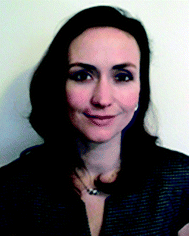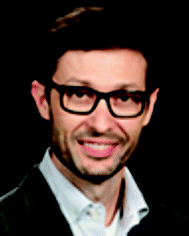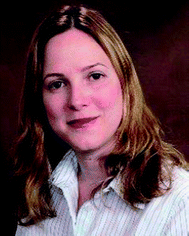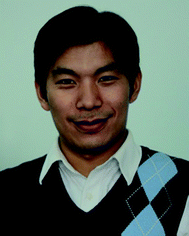DOI:
10.1039/C4TB90030H
(Profile)
J. Mater. Chem. B, 2014,
2, 2334-2344
Profile: Emerging investigators
Elisa Barea obtained her PhD in 2004 at the University of Granada. After a postdoctoral stage at the University of Milan (2006–2008), she obtained a research contract (Ramon y Cajal Grant) to join the University of Granada. Since April 2011, she has been an Associate Professor in the Department of Inorganic Chemistry. Her current research focuses on the study of porous coordination polymers with potential applications in air purification and drug delivery. The quality of her research has been recognized by the Excellence Research Award of the University of Granada (2011) and the Young Researcher Award of the Spanish Royal Society of Chemistry (2012).
Daniela A. Wilson received her PhD with
summa cum laude from “Gh. Asachi” Technical University of Iasi, Romania. During her PhD she obtained two fellowships in Japan and UK as an exchange PhD student and a Marie Curie fellow. After two postdoctoral positions at the University of Pennsylvania, Philadelphia, USA and Radboud University Nijmegen, Netherlands, she joined the Institute of Molecules and Materials in Nijmegen as Assistant Professor. In 2012 she was awarded a 1.5 million euro ERC starting grant to establish an independent research line investigating nanomotors with autonomous propulsion in biological systems. Her research interests span a broad range of topics at the interface of supramolecular chemistry, macromolecular chemistry, and nanotechnology. Her current focus is on the design of intelligent, self-propelled and self-guided supramolecular assemblies as next-generation nano-engined delivery systems.
Jeffrey Capadona received his B.S. in chemistry from Saint Joseph's College in Rensselaer, IN in 2000, and his PhD from Georgia Institute of Technology in 2005. Since then, Dr Capadona has been a Research Health Scientist with the L. Stokes Cleveland Department of Veterans Affairs. In August 2010, Dr Capadona began a tenure track appointment in the Department of Biomedical Engineering at Case Western Reserve University. Dr Capadona has co-authored two patents, two book chapters, ∼95 scientific abstracts and over 28 peer-reviewed scientific manuscripts. Dr Capadona's recent awards include: the Case School of Engineering Faculty Research Award, multiple graduate student mentoring awards, and the 2011 Presidential Early Career Award.
Changchun Wang received his PhD in polymer chemistry and physics from Fudan University in 1996. He was a visiting scientist at Eastern Michigan University in 1996–1998. He is now a Professor in the Department of Macromolecular Science at Fudan University. He has published over 170 peer-reviewed journal papers and 3 book chapters with total citations of over 3500. His research interests are in the design and synthesis of various polymer microspheres and functional composite nanomaterials with controlled structures and properties for DNA and protein enrichment, biomarker detection and targeting drug delivery.
Thorben Cordes is an Assistant Professor of “super-resolution microscopy” at the University of Groningen (The Netherlands) within the Zernike Institute for Advanced Materials and the Centre for Synthetic Biology. His “Molecular Microscopy” research group focuses on the development and application of novel fluorescence-based single-molecule techniques to study (bio)chemical systems. Current research deals with mechanistic questions of membrane transport proteins in bacteria, (bio)chemical catalysis and probe development for fluorescence microscopy and super-resolution microscopy.
Dal-Hee Min is Associate Professor of the Department of Chemistry at Seoul National University (Korea). Her research involves the development of bioanalytical platforms utilizing various nanomaterials for diagnostics, biosensing, drug discovery and drug delivery systems with collective understanding of nano-surface chemistry, cellular behavior and the interactions of biomolecules with nanomaterials. Especially, her group focuses on biological applications of graphene derivatives and porous nanomaterials. Her recent scientific awards include a Distinguished Lectureship Award (The Chemical Society of Japan, 2013) and the KCS-Wiley Young Chemist Award (The Korean Chemical Society & Wiley-VCH, 2012).
Patricia Y. W. Dankers is Assistant Professor in the Department of Biomedical Engineering and the Institute for Complex Molecular Systems at the Eindhoven University of Technology (TU/e), The Netherlands. She studied chemistry at the Radboud University Nijmegen. In 2002 she started her first PhD in natural sciences at TU/e studying supramolecular biomaterials under supervision of Prof. Dr Bert Meijer. In a second PhD in medical sciences at the University of Groningen she worked on kidney regenerative medicine together with Prof. Dr Marja J. A. van Luyn (2013). Additionally, she worked for the company SupraPolix in Eindhoven. In 2010 she performed research in the Institute for BioNanotechnology in Medicine at Northwestern University Chicago in the group of Prof. Dr Samuel I. Stupp. She recently received an ERC starting grant (2013). Her particular research interests are in the synthesis of bio-inspired functional biomaterials, and their translation to biomedical applications in the field of regenerative medicine. Besides scientific research her other interests involve playing the clarinet, and enjoying life with her little son and family.
Willem van Dorp is a research fellow studying nanolithography at the University of Groningen in the Netherlands at the Department for Applied Physics, Zernike Institute for Advanced Materials. His expertise is electron microscopy, high-resolution writing and electron-induced chemistry. He currently focuses on developing novel compounds for focused electron beam induced processing and the selective patterning of functional molecules on surfaces.
Eileen Gentleman is a Wellcome Trust Research Career Development Fellow in the Department of Craniofacial Development & Stem Cell Biology at King's College London. After completing her PhD in biomedical engineering at Tulane University (USA) in 2005, Eileen joined Imperial College London as a postdoctoral research associate. In 2011, she moved to King's where her research focuses on utilising biomaterial systems to direct stem cell differentiation to bone and cartilage. Her multi-disciplinary research group also studies biomineralisation and the role of mechano-sensing in tissue development. Her work at the engineering–biological science interface has recently been recognised with a prestigious Philip Leverhulme Prize (2013).
Fan Zhang received his PhD in 2008 from Fudan University followed by more than 2 years postdoctoral experience in the University of California at Santa Barbara before joining the Chemistry Department of Fudan University as an associate professor in 2010. His current research interests include the development of multifunctional nanostructured materials and nanotechnology for applications in bioanalysis. Prof. Zhang has authored more than 60 peer-reviewed research papers, a number of book chapters, and patents.
Niels Holten-Andersen received his PhD with Prof. Herb Waite at the University of California, Santa Barbara, characterizing the hierarchical material design of mussel holdfast fibers. Based on his PhD work he received a postdoctoral fellowship from the Royal Danish Agency of Science and Technology to pursue implementation of material design principles distilled from nature in synthetic polymer materials with Prof. Ka Yee Lee at the University of Chicago. He is currently the principal investigator of the Laboratory for Bio-Inspired Interfaces (LBI) at the Department of Materials Science and Engineering at Massachusetts Institute of Technology.
Ji-Ho Park is an Assistant Professor of Bio and Brain Engineering at Korea Advanced Institute of Science and Technology (KAIST). He received his PhD degree in materials science from the University of California, San Diego in 2009. After performing his postdoctoral studies in chemistry at the University of California, Berkeley, he joined the faculty in the Department of Bio and Brain Engineering at KAIST in 2010. He is the author of over 40 research publications in journals including
Nat. Mater.,
Nat. Nanotechnol. and
Proc. Natl. Acad. Sci. U. S. A., in subjects related to nanomedicine, drug delivery, biomaterials, and tissue engineering. He has 8 patents or patents pending.
Joel Collier is an Associate Professor at the University of Chicago. He is appointed in the Department of Surgery and is a Fellow of the Institute for Molecular Engineering. His research focuses on self-assembling biomaterial systems and how they may be engineered for a variety of purposes including vaccines, 3D cell culture, and tissue repair. He has received degrees from Rice University (B.S.), The University of Texas at Austin (MS), and Northwestern University (PhD), and he did his postdoctoral work in the Chemistry Department at the University of Chicago. His research is supported by the NIH, the Bill and Melinda Gates Foundation, and other agencies.
Benjamin Kselowsky: The Biomaterial Immuno-Engineering Lab focuses on the engineering of biomaterial–cell interactions, and targeted controlled release of immune modulating factors in order to direct immune cell function. Biomaterials undergo complex interactions with cells of the immune system upon implantation. These interactions are incompletely understood and poorly controlled, which complicates the ability to achieve favourable outcomes in clinical applications. My efforts focus on both a basic understanding of interactions of immune cells with biomaterials as well as the engineering of biomaterials capable of directing immunological processes. This work has wide-ranging implications in diverse fields such as implanted devices, therapeutic vaccines, tissue engineering, and combination products. I am particularly interested in directing the phagocytic antigen present cell types of dendritic cells and macrophages.
Ali Khademhosseini is an Associate Professor at Harvard University and holds appointments at the Harvard-MIT Division of Health Sciences Technology, Brigham & Women's Hospital. In addition, he is on the faculty of the Wyss Institute for Biologically Inspired Engineering at Harvard University and the World Premier International-Advanced Institute for Materials Research (WPI-AIMR) at Tohoku University. He is an internationally recognized bioengineer regarded for his contributions and research in the areas of bioengineering, biomaterial synthesis, microscale technologies, and tissue engineering. His research involves the development of micro- and nano-scale technologies to control cellular behavior, fabrication of microscale biomaterials and engineering systems for tissue engineering, drug discovery and cell-based biosensing. He has edited 4 books and 8 journal special issues and is an author on more than 220 articles in peer-reviewed journals, 90+ book chapters/editorials, 160 abstracts, and 15 patent/disclosure applications.
Eugenia Kharlampieva is an Assistant Professor of Polymer Chemistry at the Department of Chemistry at the University of Alabama at Birmingham. She received her PhD in polymer science from the Stevens Institute of Technology and postdoctoral training in materials science and engineering at the Georgia Institute of Technology. Her research centers at the intersection of polymer chemistry, nanotechnology, and biomedical science and includes synthesis and assembly of polymers and nanostructures as novel platforms for therapeutic applications such as controlled delivery and regenerative medicine. She has authored more than 60 articles and she serves on an advisory committee in neutron scattering at ORNL and on the Editorial Board of
J. Anal. Bioanal. Tech.
LaShanda T. J. Korley joined the faculty of Case Western Reserve University in July 2007 as an Assistant Professor in the Department of Macromolecular Science and Engineering and currently holds the Climo Assistant Professorship. LaShanda Korley earned a B.S. in chemistry and engineering from Clark Atlanta University and a B.S. in chemical engineering from Georgia Institute of Technology in 1999. Dr Korley completed her doctoral studies at Massachusetts Institute of Technology in the Department of Chemical Engineering and the Program in Polymer Science and Technology in 2005. LaShanda Korley completed a two-year Provost's Academic Diversity Postdoctoral Fellowship at Cornell University in chemical engineering. Her research focuses on the development of mechanically enhanced, multifunctional polymeric materials for energy and sustainability, biomedical devices, protective fabrics, and structural materials. Dr Korley's research efforts have been recognized by a National Science Foundation CAREER Award, a 3M Nontenured Faculty Grant, and a DuPont Young Professor Award. In 2012, Prof. Korley participated in the Japanese/American Frontiers of Science Symposium as a Kavli Fellow and the National Academy of Engineering's U.S. Frontiers of Engineering Symposium. She was recently nominated (1 of 6 internationally) for the Young Talent Award, Polymers for Advanced Technologies Congress 2013.
Marco Rolandi, PhD, is an Assistant Professor of Materials Science and Engineering at the University of Washington (2008). He received his PhD in applied physics from Stanford University (2005) while working with Prof. Hongjie Dai and completed his postdoctoral training with Prof. Jean M. J. Fréchet at the University of California, Berkeley (2008). His research focuses on micro- and nano-biological and bioinspired materials, their integration in biocompatible devices, and translational applications. His work has been highlighted in The New York Times, New Scientist, MRS 360, IEEE Spectrum, Materials Views, Engadget, Popular Science, and several other sites.
Meital Reches received her B.Sc. in biology (2002) from Tel Aviv University. Her PhD (with distinction) was awarded in 2007 for her thesis performed under the guidance of Prof. Ehud Gazit at the Department of Molecular Microbiology and Biotechnology, Tel Aviv University. In the years 2007–2010, she was an EMBO and a HFSP postdoctoral research fellow under the guidance of Prof. George M. Whitesides at Harvard University. Meital Reches joined the Institute of Chemistry at the Hebrew University of Jerusalem as a faculty member in October 2010. Her research focuses on developing new biomolecular self-assembled systems and the study of protein and peptide interactions with inorganic surfaces. During her career Meital Reches was awarded with the Biotechnology and Applied Biochemistry Young Investigator Award, the Dan David scholarship and the Teva Prize.
Melissa Reynolds has put together an impressive body of work since joining the Department of Chemistry at Colorado State University in 2009. Her research focuses on the molecular design and fabrication of biomimetic materials for use in medical device applications. It was that work that led to the discovery of materials that speed the healing of battlefield wounds and other serious injuries suffered in natural disasters. She and her startup company, Diazamed, received a 2013 TechConnect National Innovation Award. In addition to her groundbreaking research, Reynolds loves the classroom and was named 2011 Educator of the Year by the Colorado Bioscience Association. She and husband Ben live in Fort Collins, Colorado.
Michael J. Serpe received his B.S. at the University of Central Florida in 2000. He received his PhD from the Georgia Institute of Technology in 2004, working in the group of Professor Andrew Lyon. There he developed novel polymeric materials for applications in drug delivery, microoptic arrays, and photonics. After conducting research in industry, he joined the group of Professor Stephen Craig at Duke University in 2006. There he used single-molecule force spectroscopy to investigate reversible polymer bridging between surfaces. He joined the Department of Chemistry at the University of Alberta as an Assistant Professor in 2009. The Serpe group is studying various aspects of colloid, polymer and surface science, with special interests in developing novel photonic materials from responsive polymers, water remediation, controlled drug delivery and polymer mediated surface–surface interactions. Prof. Serpe has been named a Grand Challenges Canada Rising Star in Global Health, received the 2013 Petro Canada Young Innovator Award, and has been named one of Edmonton's Top 40 Under 40 by Avenue Magazine for 2013–2014.
Timothy Tan has lived in Asia, Australia and Europe. Through his experiences with various cultures and people, he has embraced a boundless interests in sciences, arts, social issues, music, movies and sports. A fateful day in 1999 when he was told “science knows no boundaries” led him to his PhD studies after his Bachelor of Engineering (Chemical) degree in the University of New South Wales, Australia. After a short stint as a research fellow in A*STAR Singapore, he joined Nanyang Technological University Singapore as a faculty member in 2005 and continues his research in designing and tailoring materials architecture for energy harvesting, water purification and biomedical application. He is currently an Associate Professor in the School of Chemical and Biomedical Engineering, and relishes the opportunity to challenge boundaries and adopt atypicality.
Yiyun Cheng is a professor of biomedical engineering at the School of Life Sciences, East China Normal University. He received his PhD from the University of Science and Technology of China and was a postdoctoral fellow at Washington University in St. Louis. Yiyun has won many awards including the National Science Foundation of Excellent Young Scholars, the Shanghai Dawn Scholar, the Shanghai Rising Star, and the New Century Excellent Talents in the Universities of Ministry of Education, China. He was a Regional Editor of
Current Drug Discovery Technologies and an Editorial Board Member of several international journals, and has been invited as a reviewer for more than 100 international journals. Yiyun has published more than 60 peer-reviewed manuscripts including
Nat. Mater.,
Nat. Commun.,
Chem. Rev.,
Chem. Soc. Rev. and
J. Am. Chem. Soc. His research interests are focused on the biomedical applications of dendrimers and other dendritic polymers.
Zhihong Nie received his PhD degree in polymer materials and chemistry under the supervision of Eugenia Kumacheva at the University of Toronto, Canada in 2008. He then worked as a NSERC Postdoctoral Fellow in the group of George M. Whitesides at Harvard University (2008–2010). In 2011, he was appointed as an Assistant Professor in the Department of Chemistry and Biochemistry at the University of Maryland, College Park. He was the recipient of a K. C. Wong Research Scholarship (2011), an NSF CAREER Award (2012), and an ACS PRF Doctoral New Investigator Award (2013). His research interests focus on molecular and colloidal self-assembly, bioimaging and drug delivery, biomimetic materials, nanoparticle synthesis, and microfluidics.
Roísín M. Owens is an Associate Professor in the Department of Bioelectronics at the Centre Microélectronique de Provence. She received her BA degree in biochemistry at Trinity College Dublin, and her PhD degree in biochemistry and molecular biology at Southampton University. In her early postdoc work she specialized in biochemical aspects of infectious diseases, including enteric pathogens and tuberculosis, but then moved into novel therapeutics (for rhinovirus) using protein engineering and development of new technologies for pathogen detection. A continued interest in novel engineering technologies for biological applications led her to the field of organic bioelectronics. Her current research centers on the application of organic electronic materials for diagnostics
in vitro. She has received several awards including the European Research Council starting grant, a Marie Curie fellowship, and an EMBO fellowship.
Pascal Jonkheijm (1978) is adjunct professor and heading the Laboratory of Bio-inspired Molecular Engineering at the MESA+ Institute for Nanotechnology and the University of Twente. After obtaining a PhD in supramolecular chemistry with E. W. Meijer he was a Humboldt Fellow at the Max Planck Institute of Molecular Physiology with H. Waldmann. He received a Starting ERC Grant “Supramolecular manipulation of cells” and recently an NWO Innovation VIDI Grant on “Engineering molecular interfaces to cells”. His group aims to develop dynamic chemical strategies to understand, direct and manipulate cellular processes with temporal and spatial control (densities, specificities, separation). Insights will be used to make a new generation of smart biomaterials, to fabricate multifunctional biochips and to renew synthetic biology.
Qiang Lu received his MS degree from the Research Center of Materials Science of Beijing Institute of Technology and a PhD degree from the Department of Materials Science and Engineering of Tsinghua University. After postdoctoral training at Tufts University in 2007–2009, he joined Soochow University as a professor. Lu has published over 40 papers in refereed journal. His research interests mainly focus on characterization and properties of silk-based materials, and their fabrication and applications in biomaterials.
Xingyu Jiang obtained his B.S. at the University of Chicago (1999), followed by an A.M. (2001) and a PhD (2004) from Harvard University (chemistry), working on microfluidics and cell patterning. He joined the NCNST in 2005 where he has remained since. Xingyu's research interests include electrospinning, surface chemistry, microfluidics, cell biology, and immunoassays.
Timothy F. Scott is an Assistant Professor in the Department of Chemical Engineering and the Macromolecular Science and Engineering Graduate Program at the University of Michigan. He received a B.Sc. (Hons) degree in chemistry (2002) from the University of Melbourne, Australia, and subsequently earned his PhD in materials engineering (2006) from Monash University, Australia. Research within the Scott group is focused on the reaction kinetics and thermodynamics of dynamic covalent chemistries, and on exploiting the attributes of radicals for unique polymer fabrication and manipulation strategies to yield materials for biomedical devices, membrane separators and energy capture and storage media.
Won Jong Kim received his B.S. from Hanyang University in 1998, and MS and PhD in biomolecular engineering in 2004 from Tokyo Institute of Technology. During his graduate studies with Profs T. Akaike and A. Maruyama, he developed a polymer mediated DNA detection system. From 2004 to 2007, he was a postdoctoral fellow at the University of Utah under the supervision of Prof. Sung Wan Kim. Currently, he holds an associate professor position at the Department of Chemistry, Pohang University of Science and Technology (POSTECH), and is a group leader of the Center for Self-assembly and Complexity, Institute for Basic Science (IBS).
|
| This journal is © The Royal Society of Chemistry 2014 |
Click here to see how this site uses Cookies. View our privacy policy here. 





























